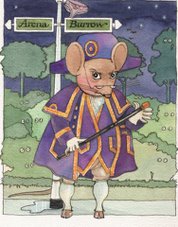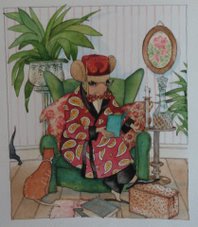I’ve known some remarkable women. I wrote about one of them – Freda Levson – in an early blog. Another was Charlotte Wolff [1897-1986]. Charlotte was born in East Germany in 1897, the child of a prosperous Jewish merchant, and spent much of her childhood in Danzig, an ancient and picturesque city which she vividly recreates in her autobiographical books On the Way to Myself [1969] and Hindsight [1980]. Studying philosophy [under Husserl and Heidegger] and medicine at several German universities, she qualified as a doctor in Berlin in 1925 and worked in a pioneering family planning clinic in a poorer part of the city. She had a wide circle of literary and artistic friends, including Walter Benjamin and his wife Dora. She was also an upfront lesbian, often dressing in mens’ attire and frequenting the homosexual clubs which were a feature of the city’s vibrant nightlife in the Weimar era.
Always a Romantic who gave primacy to her emotions, Charlotte, while still a schoolgirl, had fallen deeply in love with a Russian girl living in Berlin, Lisa, who was taken back to Russia by her mother in 1917, shortly after the Bolshevik revolution. She married there and had a daughter, but Charlotte never forgot her, and when Lisa revisited Berlin in 1923 they revived their passionate affair. After her departure Charlotte was desolate. One day she said to a friend: “Unless I see her again, I shall jump into the Spree”. Another friend, who became Charlotte’s inseparable companion for the next nine years, vowed to make it possible, and in 1924 they set off together into the unknown, Charlotte having obtained a visa so that she could lecture in Russia on the Bauhaus and abstract art.
Lisa was in a sanatorium in the Crimea, having contracted tuberculosis. After a long and eventful journey they reached her, and idyllic weeks followed until Lisa’s husband suddenly arrived. Outwardly charming, but implacably hostile, he was the perfect host for a few days until Lisa informed Charlotte that she must leave immediately and never contact her again. Devastated, Charlotte left the Crimea sickening for a severe bout of malaria, and was ill in bed for several weeks before she could leave Russia. She never heard from Lisa again.
Charlotte recounts that she was unaware of anti-Semitism in German society before the 1930s. But the advent of Hitler changed the climate with alarming rapidity, and after a threatened arrest for cross-dressing and ‘espionage’, Charlotte decided to leave Germany. After an anxious journey she reached Paris safely. Once there, she was faced with the problem of earning a living. While still in Germany she had become interested in the human hand and the psychological insights to be gleaned from its contours and gesture. She soon made influential literary friends, including Thomas Mann and Aldous Huxley and his wife Maria, through whom she became acquainted with the Surrealists, and began taking hand readings of many well-known people, including Marcel Duchamp, Max Ernst, Man Ray, Ravel, TS Eliot, Virginia Woolf, George Bernard Shaw, and Aldous Huxley, whose prints are reproduced in her book Studies in Handreading [1936].
Later she moved to London, where she continued to earn her living through hand-reading, her subjects ranging from the Duchess of Windsor to the monkeys at the zoo. Eventually she was allowed to resume her profession as a doctor and psychotherapist.
When I met Charlotte she was already in her seventies and keen to embark upon some ambitious research into sexuality. The result was her books on Love Between Women [1971] and Bisexuality. A Study [1979]. She was a dedicated worker, and when she was engaged on a book one scarcely saw her for months on end. Our occasional meetings, however, compensated for the long intervals by the fascination of her conversation and her inexhaustible store of anecdotes.
In her eighties, Charlotte embarked on her last and most ambitious project – a Life of Magnus Hirschfeld [1868-1935], the homosexual Jewish sexologist who founded the first research institute for the study of sexual minorities in Berlin in 1897, and whose irreplaceable library was barbarously burned in public by the Nazis. Her researches, and the book’s publication in 1987, led to Charlotte’s return to Berlin for the first time in half a century, and to her apotheosis by German lesbians as “an ancient radical in woollen stockings”.


14 comments:
Duchess of Windsor and the monkeys at the zoo?
Anticant : you are on good form today I see.
'Ancient radical in woolen stockings'
Sorry, GrumpyOne, but I get this vision of 'Norah Batty with attitude'.
De mortuis nil nisi bonum and all that rubbish - she was certainly one of the odder people I've known. But gutsy with it, and one couldn't withold a certain sneaking admiration for her determination to be herself, come hell or high water. Worth remembering - and reading.
I'm trying, and comprehensively failing, to imagine Nora Batty without attitude.
Charlie sounds like a bit of an oddity, though. Good on her.
I am intrigued by the Anticant admission that he had a "sneaking admiration for her....".
have you been sneaking around or up somewhere with this lady ?
Anticant : you can tell us.
Some British lesbians I knew, with a less solemnly reverential attitude than their German sisters, used to say: "Watch out! Hands behind your backs - here comes Charlie."
Zola, I don't fancy ancient radicals in woollen stockings of my own sex, let alone the opposite one.
Talking about women with attitude and all that . Did Ena Sharples ever write a book?
"Women with attitude". Isn't that rather a sexist remark? You'll have lavenderblue and Suzon on the warpath if you don't look out.
You outdo yourself, Anticant. A perfect summary biography of a woman whose attributes as a fighter reflect a human condition not easily found anywhere.
De mortuis nil nisi bonum ?
Pinochet was a bastard, as was Ford.
Thatcher?. Don't start me........
An ace post, AC. Thanks.
Does she ever mention running into that other intellectual child of Heidegger, Hannah Arendt? Arendt would have left Germany for Paris at around the same time, I'm guessing.
She doesn't mention Arendt. She did know a lot of interesting people, though.
One of her memorable sayings, which I have found to be very true, is:"How sad that the people who glitter and bewitch us with their magnetism are, more often than not, the least reliable as friends and professional colleagues."
BTW : Concerning Arendt and others from that atmosphere. I think that the Brit Geoffrey Winthrop Young would have been one connecting link in all this too.
This especially after the Abraham Lincoln Stiftung work in Germany.
Just out of interest.
Lovely story Anticant.........more, please........
Just reading a book about the Art of Bloomsbury.Exhilarating.
Post a Comment